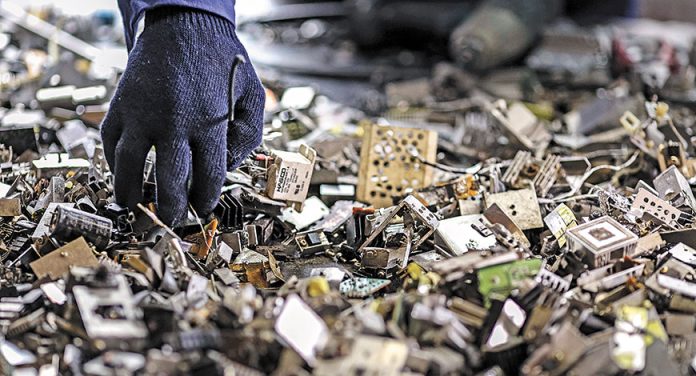For decades, Urban mining In India has gained huge attention due to the criticality of managing electronic waste safely. Considering the scenario that e-waste in India is handled by untrained scrap dealers, the government is introducing reforms to ensure the safe disposal of electronic waste along with recycling of the precious metals and minerals.
India’s consumer electronics market is constantly surging. While it is good for the economy, it also leads to a huge amount of EEE – electronic and electrical equipment that gets discarded, better known as e-waste.
According to CPCB, during 2020-2021, India processed close to 3.4 lakh tonnes of e-waste and the generation of plastic waste per year is increasing by 3%.
The spike in the waste produced is due to the ever-increasing use of electronic equipment and the rapid expansion of the IT and communications industries.
Most people keep their obsolete electronic devices at home as they aren’t aware of disposing of them appropriately. Also, improper e-waste disposal is a direct threat to the environment and mankind. Hence analysing the challenges and current solutions to the growing E-waste in India is pivotal.
However, this task of ever-increasing e-waste is complex, it gives great value because e-wastes are a rich source of valuable metals that can be recovered and reincorporated into the production process.
Contemplating the scope of Urban mining in India, a Bengaluru-based Metastable Materials has started commissioning an urban mining unit in Bengaluru, Karnataka and extending its existing capabilities within the battery recycling/urban mining domain.
The Unit by the startup will infuse quality control and material handling capabilities. This will boost the recycling of hazardous end-of-life batteries and products.
Table of Contents
What is urban mining?
Urban mining involves the processes of reclaiming e-waste items deposited at landfills and extracting raw materials from them. These include a wide variety of products like wires iPhones, Android phones, tablets, etc.
Many times, e-waste products are transported overseas to developing countries where unregulated workers extract valuable raw materials. A number of times, e-waste is simply dumped in landfills where urban miners scavenge for materials that they can sell
Benefits of Urban Mining in India
As Urban mining is the process of recovering mostly metals, minerals and other essential raw materials from e-waste, it has a plethora of environmental, economic, and humanitarian benefits.
Urban mining in India promotes the notion of a circular economy and reintegrates products back into the economy to reduce waste and prolong the lifespan of finite resources.
The recycling or recovery from landfills reintroduces the raw materials of the discarded goods back into the economy.
This collection and recycling of discarded e-waste will lead to more sustainable use of raw materials.
Impact of unrecycled or informally recycled e-waste on environment and health?
E-waste carries significant environmental effects, as electronic items have materials like lead, zinc, flame retardants, and more. The informal dumping or burning of e-waste has harmful effects on the surroundings, especially water and air quality.
Furthermore, if e-waste with heavy metals is disposed of in landfills, toxins can seep into the soil and severely impact groundwater, soil quality and crops. All these activities pose direct and harmful effects on humankind.
What are the challenges to urban mining?
The world is constantly evolving and it has developed a need for the modern infrastructure to keep up the pace. There are various construction projects happening and this is certainly a welcome trend for the crushing industry. Urbanisation comes with its own challenges, as well.
- One of the main challenges to urban mining in India is the lack of technical knowledge and advanced technology. Even if advanced technology is available, most households and businesses are not aware of separating e-waste from other waste.
- Operators prefer to keep minimize the transportation due to huge costs. Also, it is not feasible for businesses to transport demolition waste and rocks, to and from. If executed frequently, this can generate more operational costs and emissions.
- Noise and dust emissions disturb the neighbourhoods.
Demand for new policies by urban mining players in India
The Union Government in India has already established circular economy committees under the NITI Aayog umbrella to identify gaps and analyse the opportunities.
The players of the minerals and metals industry are after the government to devise a new policy for urban mining. They expect the government to introduce a special provision in the extant rules relating to deep-seated minerals such as zinc, lead, copper, gold and platinum.
Some top players in the sector have suggested some structural changes, such as the ‘one Bharat-one tariff’ policy for electricity and single-window clearances to give the sector the right impetus.
For Urban mining in India, there is a regulatory push towards recycling and large companies are either themselves into recycling or have partnerships with recyclers. By the 2030s, recycled materials will become competitive and the Government will provide financial support for advanced and improved extraction.
🔥2.1 K








